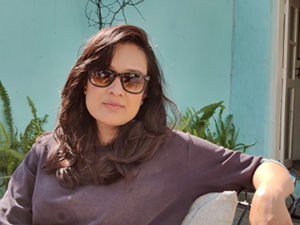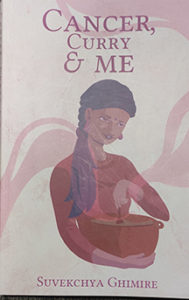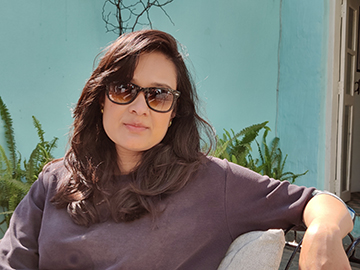
“There were no obvious symptoms like a lump or changes in skin color. It was her gut feeling that led her to go for further check-up and investigation.”
Suvekchya’s Life-changing Journey
It was during 2016— summer time—while taking a shower, that Suvekchya Ghimire realized her breasts didn’t look the same. There were no obvious symptoms like a lump or changes in skin color. It was her gut feeling that led her to go for further check-up and investigation. Her doctors told her it could be hormonal changes, and upon investigation, one thing led to another. Fortunately, she was in London when this happened, and as she says, there, they won’t let go of the patient unless everything comes out to be negative. So, a series of tests were performed.
In London, they usually don’t recommend a mammogram for women below 40 years, so she underwent an ultrasound procedure, and since the ultrasound report was unclear, a biopsy was conducted, which affirmed that she had cancer. It was seen on her right breast, and it was stage two, grade three cancer. The hospital she visited was Guy’s and St. Thomas, and she recalls that she was under the care of a fantastic team.
The ordeal was real, and it took her some time to absorb the same. After her diagnosis, there were a lot of questions to be answered; of which some didn’t even have an answer. She did lot of research and had questions for her doctors. And the medical team she had approached was very patient in terms of explaining things to her. One wouldn’t know some details like the chances of survival until the mass was examined, and it took some time. For those couple of months, the diagnosis and morbidity and the uncertainties revolved around in her mind and left her anxious. Since she had cancer in her early 30s, she also became a part of a research program conducted by King’s College, which was associated with Guy’s & St. Thomas. The hospital had a specialty branch that was dedicated to cancer patients. And cancer patients were looked after in closest attention.
Lifestyle changes after cancer
Life after cancer for Suvekchya was not the same. She became more aware, more aware about everything she was using in her life; it could be the shampoo, the body wash, or other cleaning products. And, she suggests that others do likewise: become more aware about the products one uses and screen the ingredients and chemicals in them, specially the products that we use on our bodies. She started to eat healthy and lead a healthy lifestyle that helped her in keeping other diseases at bay. Studies have found that when one reaches between 70-80 years old, 50% of the population already would have developed some sort of cancer cell in their body, but they have the immunity to fight it. If our immune system is compromised, our body can’t fight against diseases. Therefore, she started to keep her health on check, and similarly, learned to prioritize her mental health. She made sure to take out some time to do pranayam in the mornings, before heading out to the gym. It started becoming a daily mandatory routine, rather than just going when free.
During the cancer treatment, at one time, Suvekchya was taking 23 medicines. If she was given a steroid, it came with some side effects, and to overcome them, there were yet again some more medicines. She realized that one medicine was piled upon another. Nevertheless, she is really thankful to science, which has come a long way in discovering medicines, such as the ones that saved her life. It was during this time that she made a personal choice and effort in looking out for comfort food among native traditional food. She thought she should give it a try to reduce the number of medicines that were just there to reduce the side effects of another medicine.
She started seeking out traditional medicines; for this, she consulted various people back in Nepal, specially her grandmother. She discovered that thyme seeds (jwano) helped to ease her stomach discomfort. Similarly, ginger helped to reduce nausea. But, she doesn’t mean that what helped her would help others, as well, but these home remedies are worth trying. And, like other health conscious people, she suggests cutting down on junk food and replacing them with healthy meals. Similarly, she dealt with her hair loss and skin allergy during her treatment with coconut oil and turmeric and mustard oil. She limited her dairy intake when under treatment, and when she started having milk, she found that adding saffron would give her proper sleep. She did not limit her new-found knowledge and her experiences to herself; hence, this led to her book, Cancer, Curry, and Me.
Suvekchya says that keeping a positive mindset from the beginning helped her to remain focused, and this mattered a lot. We live in a competitive world, where we seek to achieve our goals, and we forget to prioritize ourselves. It is as important to take out time to do things that are required for the well-being of your body and mind. Suvekchhya reaches out to people by counseling; she does this professionally and guides people who are diagnosed with cancer, and those who have recovered, as well. She told us that, for her, to “move on” was not an easy part for in her life after her recovery. Luckily, she was cancer-free, but the surgery, medicines, steroids, and chemotherapy, along with radiotherapy, made her body very weak.
Her body wasn’t yet ready for the outer world, not yet ready to claim back her life. She needed time to come out of it, physically and mentally. She also acknowledges the fact that one medicine that worked on her might not work on another person. And, while the Internet is the main source of information nowadays, she advises people to draw out the right information and follow the right medical journals for correct information. She felt proud when she was able to breastfeed her baby after becoming cancer-free. This made her feel that her body was healing. She feels lucky that she was at the right place at the right time. She gives emphasis on body positivity and believes one should be comfortable in their skin no matter what the size or color of the body. She was comfortable with her body, which led to the diagnosis of her disease. She does her follow-up with her doctors here in Nepal while she’s here, and believes that the capital has a lot to offer in terms of advancement in medicine, even for cancer treatments.
Book Review

Suvekchya Ghimire brings her bittersweet experience of her journey after surviving breast cancer in her book, Cancer, Curry and Me, in which she beautifully metaphorizes different foods and different situations faced by her in her journey to recovery. While she does think that allopathic medicines have life-altering abilities, she believes in alternative medicines, as well. In her book, she talks about different herbs from the Indian subcontinent, including Nepal.
The recipes she shares come as a bonus for any food connoisseur. Food holds a special place in her heart. A Nepali of Burmese origin, her taste buds hold a different palate, from Indo-Nepalese cuisine to continental. And, through her book, she is trying to raise awareness and spread the message and share her personal experience. She shares her dos and don’ts for cancer patients. Not everyone wants to open up, she says, and some might be looking forward to groups who have been through a similar situation in life. In her case, she wanted someone to be there just to hold her, be with her, and to hear her. And, she’s grateful to her partner and her family, who were always by her side in the hard time of her life.
She explains how an urban girl learned to get used to the atrocities of the disease she was suffering from. She was comfortable with her body from the beginning, she affirms, which led her to a quick diagnosis, and to the bitter truth that no one is prepared for what life has planned for us. From her surgery to reconstruction, chemotherapy to radiation, life took a couple of years from her, and the post-recovery journey wasn’t great, either, as moving on was not an easy task. To go through certain procedures or not, is radiation a good idea? With hundreds of questions in her mind, despite thorough research and frequent consultations with her Doctor H, nothing could prepare her in life for the next step. But, with time, she learned to accept the changes.
Several times, her body’s reaction was different after having chemo, leading her to an ER or resuscitation room; once, due to neutropenic sepsis. When she was diagnosed with cancer, she was 32 and completing her post grad at the University of Oxford. After making a full recovery, she finished her studies and now dedicates her life to raising awareness and speaking about breast cancer. She wants to eliminate the cultural taboos regarding this subject. As she remembers, some acquaintances, who were not comfortable with their bodies and in sharing any related issues, succumbed without a proper diagnosis. According to her, cancer is treatable if detected early, and so are the chances of survival. Life wasn’t easy for her because of her ailment, but she takes this as a lesson and shares her gratitude towards life, the people around her, the power of her mind, her resilience and positive attitude toward life that helped her coming out of the difficult situation in life.
You can reach out to her at
sueghimire@gmail.com
 Medicosnext
Medicosnext




